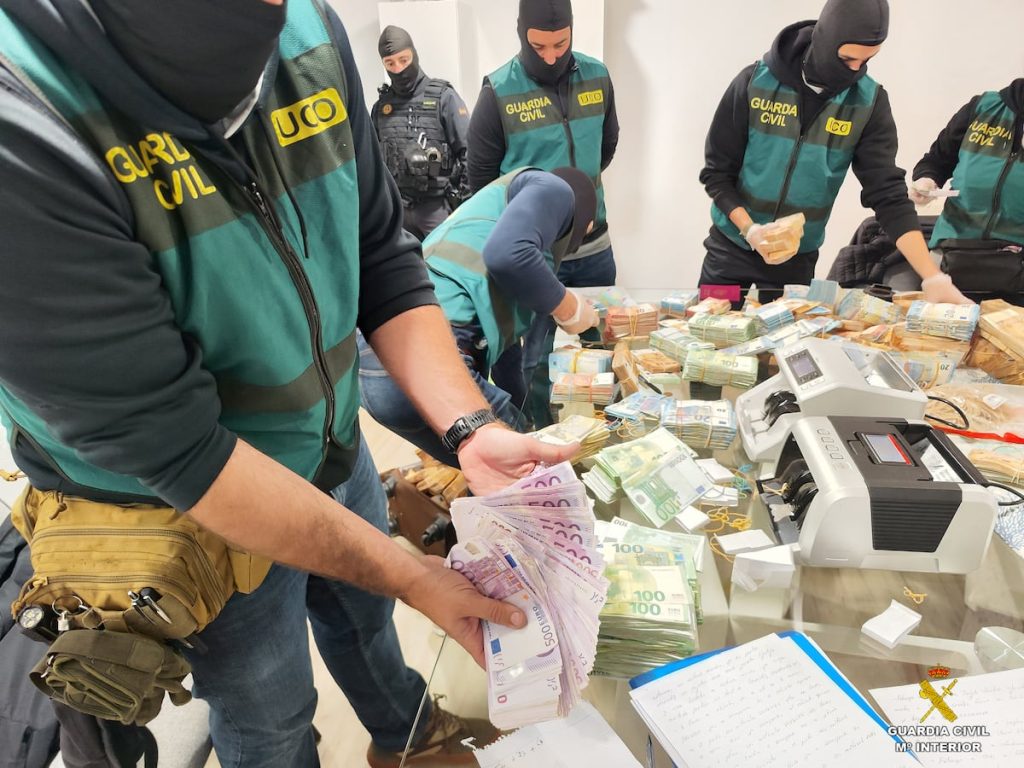For years, their names had been repeated in police reports on numerous investigations against the Galician drug trafficking. Spanish security forces, as well as those from other countries such as the U.S., had long focused on them, convinced that much of the drugs entering through the northwest coast of the peninsula were thanks to their organization. And yet, they had managed to avoid being arrested. Other rungs of their criminal structures always fell, but never them… until this week. The Civil Guard announced on Friday the arrest of Pablo Quiroga, aged 43, and Bernabé González Piñeiro, aged 47, considered the main – and most elusive – bosses of the current generation of Galician drug trafficking and alleged leaders of “one of the most prominent and active” drug trafficking networks operating in Spain, as highlighted by the Ministry of the Interior. Along with them, in an operation that involved collaboration with the European Union Agency for Law Enforcement Cooperation (Europol) and the U.S. Drug Enforcement Administration (DEA), 18 other people have been arrested, most of them in the O Salnés region, in the Arousa estuary (Pontevedra). Among them, Víctor Ramón Dopico, aged 49, the alleged right-hand man of both, who was found with nearly 3 million euros in cash at his home. Six of the arrested individuals, including the two alleged bosses and their lieutenant, have been remanded in custody by order of the National Court.
The operation also led to the seizure of 1.7 tons of hashish, 50 kilograms of cocaine, 10 kilograms of marijuana, one kilogram of heroin, one kilogram of “tusi” or pink cocaine, 750 grams of MDMA, a similar amount of amphetamine, and 10,000 ecstasy pills. With their arrest, the alleged network of ghost companies and frontmen used to launder the profits from drugs has been dismantled. Additionally, 16 cars – six of them high-end – a collection of 60 racing motorcycles, four Rolex watches, three firearms, 32 encrypted mobile phones, and various computer devices were seized. 44 bank accounts and 26 properties valued at over 10 million euros were also seized. The Operation Halia, named after a sea nymph from Greek mythology, began in early 2023 when the Civil Guard received information recovered by France from the servers of Encrochat, an encrypted messaging system used by the world’s top organized crime bosses for their illicit businesses. The recovered conversations of the now arrested individuals did not provide specific data on ongoing operations, but confirmed that both should be classified as HVTs [High-Value Targets].
Subsequent investigations revealed that the network continued to use the maritime route to bring large shipments of cocaine from Colombia to Spain, but with some innovations. Instead of using experienced sailors – who almost always had criminal records for this activity – they sought young people who had never been linked to drug trafficking and, therefore, would not raise police suspicions. In exchange for amounts ranging from 300,000 euros for the captain to 100,000 euros for each crew member, they traveled on sailboats and catamarans to the Caribbean Sea, where they loaded the merchandise onto mother ships that had departed from the coasts of South America. They then set out on the return journey. Once the drugs reached Spain, a fleet of vehicles with sophisticated compartments (double bottoms or hiding places) distributed the drugs wholesale across various Spanish provinces. The investigation also allowed the detection of one of these maritime trips, in which the organization was allegedly to bring in 4,000 kilos of cocaine in early March. However, the operation to intercept the sailboat already loaded with the drugs was thwarted when French authorities boarded the ship in the Caribbean Sea just before the drugs were received, unaware of the Spanish operation on the boat.
The setback did not halt the investigations into the main suspects who continued to hold meetings where they took “meticulous security measures” to avoid police surveillance, according to the Civil Guard. “Knowing they had been under investigation in the past, they took extreme measures to prevent being followed or their conversations being heard. They checked cars with metal detectors before getting into them to detect if there were tracking bugs or ambient microphones; they held meetings in the early hours of the morning in remote mountain areas where surveillance operations were impossible and continued to use encrypted phones for their conversations,” detail sources close to the investigation. However, the investigations bore fruit, and last Monday Quiroga was arrested at Barcelona airport as he was about to board a flight to Tangier, Morocco. The next day, the other 19 alleged accomplices were arrested, including González Piñeiro and Dopico, and 27 searches were carried out. The investigation has revealed the alleged roles each played. Sources from the law enforcement agency place Quiroga at the top, responsible for organizing the entire maritime operation to bring drugs into Spain. “He was number one,” they emphasize. Quiroga’s criminal record only includes one arrest in 2005, when he was 25 and subordinate to another group. He was implicated in a hashish seizure in Seville, but was ultimately acquitted. González Piñeiro, considered his second, also had no prior criminal record and allegedly handled the large-scale distribution of drugs in Spain through camouflaged cars and vans. Dopico, the third in the hierarchy, had at least one previous arrest in 2013 in an operation against one of the most infamous Galician drug trafficking clans, Los Charlines. In Dopico’s residence, the Civil Guard found most of the 3 million euros in cash seized, a million of which was in the trunk of his car, allegedly ready for payment. The remaining money in bundles of bills was found in boxes, backpacks, and suitcases visible to anyone entering the residence. Numerous packages of hashish were also found in a refrigerator in another residence. “As it had been hot in recent days, they had put it in there to prevent it from losing quality,” detail police sources.


